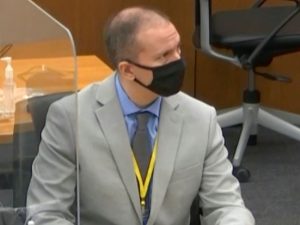Jury selection in the highly-anticipated trial of former Minneapolis police officer Derek Chauvin began in district court on Tuesday, even as the judge in the case awaits higher courts’ rulings that could halt the proceedings. Chauvin faces charges in the killing of George Floyd last Memorial Day.
The trial has gotten off to a tentative start, with both the prosecution and defense filing appeals after a higher court ruled on Friday that Hennepin County Judge Peter Cahill should reconsider his original decision to dismiss a third-degree murder charge against the former Minneapolis police officer.
At times during Tuesday morning’s proceedings, Cahill paused to let attorneys check their phones for possible word of rulings from either the state appeals court or the Minnesota Supreme Court.
As the trial loomed, demonstrations against police brutality and racial inequality have regained momentum in Minneapolis. Videos show that Chauvin, who is white, kept his knee on Floyd’s neck for nearly nine minutes before he died. Floyd was Black.
Chauvin’s defense attorney, Eric Nelson, is asking the Minnesota Supreme Court to review the appeals court ruling, hoping their client can avoid the additional charge. Chauvin currently faces charges of second-degree unintentional murder and second-degree manslaughter in Floyd’s death.
But in their own appeal, prosecutors are asking the state appeals court to delay the trial, saying Cahill’s district court does not have full jurisdiction until the Supreme Court has ruled. To proceed with any substantive matters before the murder charge issue is settled, the prosecution warns, could open the door to an appeal after the trial is over.
Cahill has disagreed with part of the prosecution’s argument, saying that in homicide cases, there is precedent for adding or omitting a charge after a jury is selected. But he also acknowledged that the higher court should be given time to rule on the jurisdiction issue.
Jury selection had been poised to begin on Monday, with a pool of potential jurors at the courthouse. But the judge, citing the appeals, said he had no choice but to send the jury pool home for the day.
Despite the initial delay, the court was able to resolve a number of preliminary motions on Monday afternoon, starting to set the scope of testimony and evidence for the trial. And 16 people were dismissed from the jury pool, based on their responses to a 14-page questionnaire they filled out. The form asked potential jurors questions such as what already know about Floyd’s death, whether they took part in a protest, and how they get their news.
The two sides also agreed that after a witness testifies, they can’t be called back to the stand if they have watched the trial. But expert witnesses would be allowed to watch other experts’ testimony in case they’re called upon to provide a rebuttal.
The witness list in the Chauvin case is long: 362 people are on the state’s list of potential witnesses, and 400 “all told,” accounting for duplicates from the defense side, Cahill said during Monday’s hearing.
The prosecution also agreed that no expert will be allowed to compare Floyd’s death to “to the crucifixion of Jesus Christ on the ground that such analogy is prejudicial,” as member station Minnesota Public Radio reported.
Chauvin is attending the court proceedings in person, sitting near Nelson at a partitioned table, wearing a coat and tie and a black face mask.
Jury selection in Chauvin’s trial is expected to last several weeks, as the judge and attorneys select 12 jurors and up to four alternates. Opening arguments aren’t expected in the case until the week of March 29. Chauvin’s trial is expected to last through much of April.
Minnesota Attorney General Keith Ellison is leading the state’s case against Chauvin. The former police officer’s defense team is led by Nelson.
Floyd’s death inflamed nationwide protests that quickly spread around the world, fueled by the dramatic video in which Chauvin is seen pinning Floyd to the asphalt. “Please, please. I can’t breathe,” Floyd repeatedly said before he died.
Chauvin and the other three police officers who were at the scene — Tou Thao, J. Alexander Kueng and Thomas K. Lane — were fired one day after Floyd was killed. They were arrested several days later. Thao, Kueng and Lane face charges of aiding and abetting murder.



















